Memoirs of P.P. Bliss: Chapter
24
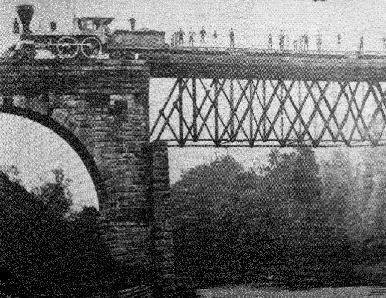
The Ashtabula Bridge, before the crash. |
The railroad train on which Mr.
and Mrs. Bliss rode to their death left Buffalo, New York, on Friday afternoon,
December 29, 1876. At eight o'clock that evening, while approaching Ashtabula
station, and crossing a ravine, the bridge gave way, and the train, with its
precious freight of human lives, was precipitated to the bottom. Fresh as
is the memory of this horror in the minds of all, the newspaper accounts given
at the time will be read now with renewed interest, and fittingly form a part
of the record made in these pages.
Dispatch to the Chicago Tribune
ASHTABULA, OHIO, December 30, 1876
The proportions of the Ashtabula
horror are now approximately known. Daylight, which gave an opportunity to
find and enumerate the saved, reveals the fact that two out of every three
passengers on the fated train are lost. Of the 160 passengers who the maimed
conductor reports as having been on board, but fifty-nine can be found or
accounted for. The remaining 100, burned to ashes or shapeless lumps of charred
flesh, lie under the ruins of the bridge and train.
The disaster was dramatically
complete. No element of horror was wanting. First, the crash of the bridge,
the agonizing moments of suspense as the seven laden cars plunged down their
fearful leap to the icy river-bed; then the fire, which came to devour all
that had been left alive by the crash; then the water, which gurgled up from
under the broken ice and offered another form of death, and, finally, the
biting blast filled with snow, which froze and benumbed those who had escaped
water and fire. It was an ideal tragedy.
The scene of the accident was
the valley of the creek which, flowing down past the eastern margin of Ashtabula
village, passes under the railway three or four hundred yards east of the
station. Here for many years after the Lake Shore road was built, there was
a long wooden trestle-work, but as the road was improved, this was superseded
about ten years ago with an iron Howe truss,built
at the Cleveland shops, and resting at either end upon high stone piers, flanked
by heavy earthen embankments. The iron structure was a single span of 159
feet, crossed by a double track seventy feet above the water, which at that
point is now from three to six feet deep, and covered with eight inches of
ice. The descent into the valley on either side is precipitous, and, as the
hills and slopes are piled with heavy drifts of snow, there was no little
difficulty in reaching the wreck after the disaster became known.

The rescue efforts after the crash. |
The disaster occurred shortly before
eight o'clock. It was the wildest winter night of the year. Three hours behind
its time, the Pacific Express, which had left New York the night before, struggled
along through the drifts and the blinding storm. The eleven cars were a heavy
burden to the two engines, and when the leading locomotive broke through the
drifts beyond the ravine, and rolled on across the bridge, the train was moving
at less than ten miles an hour. The head lamp threw but a short and dim flash
of light in the front, so thick was the air with the driving snow. The train
crept across the bridge, the leading engine had reached solid ground beyond,
and its driver had just given it steam, when something in the undergearing of
the bridge snapped. For an instant, there was a confused crackling of beams
and girders, ending with a tremendous crash, as the whole train but the leading
engine broke through the framework, and fell in a heap of crushed and splintered
ruins at the bottom. Notwithstanding the wind and storm, the crash was heard
by people within-doors half a mile away. For a moment there was silence, a stunned
sensation among the survivors, who in all stages of mutilation lay piled among
the dying and dead. Then arose the cries of the maimed and suffering; the few
who remained unhurt hastened to escape from the shattered cars. They crawled
out of windows into freezing water waist-deep. Men, women and children, with
limbs bruised and broken, pinched between timbers and transfixed by jagged splinters,
begged with their last breath for aid that no human power could give.
Five minutes after
the train fell, the fire broke out in the cars piled against the abutments at
either end. A moment later, flames broke from the smoking-car and first coach
piled across each other near the middle of the stream. In less than ten minutes
after the catastrophe, every car in the wreck was on fire, and the flames, fed
by the dry varnished work and fanned by the icy gale, licked up the ruins as
though they had been tinder. Destruction was so swift that mercy was baffled.
Men who, in the bewilderment of the shock, sprang out and reached to solid ice,
went back after wives and children and found them suffocating and roasting in
the flames. The neighboring residents, startled by the crash, were lighted to
the scene by the conflagration, which made even their prompt assistance too
late. By midnight, the cremation was complete. The storm had subsided, but the
wind still blew fiercely, and the cold was more intense. When morning came,
all that remained of the Pacific Express was a windrow of car wheels, axles,
brake-irons, truck-frames and twisted rails lying in a black pool at the bottom
of the gorge. The wood had burned completely away, and the ruins were covered
with white ashes. Here and there a mass of charred, smoldering substance sent
up a little cloud of sickening
vapor, which told that it was human flesh slowly yielding to the corrosion of
the fires. On the crest of the western abutment, half buried in the snow, stood
the rescued locomotive, all that remained of the fated train. As the bridge
fell, its driver had given it a quick head of steam, which tore the drawhead
from its tender, and the liberated engine shot forward and buried itself in
the snow. The other locomotive, drawn backward by the falling train, tumbled
over the pier and fell bottom upward on the express car next behind. The engineer,
Folsom, escaped with a broken leg; how, he cannot tell, nor can anyone else
imagine.
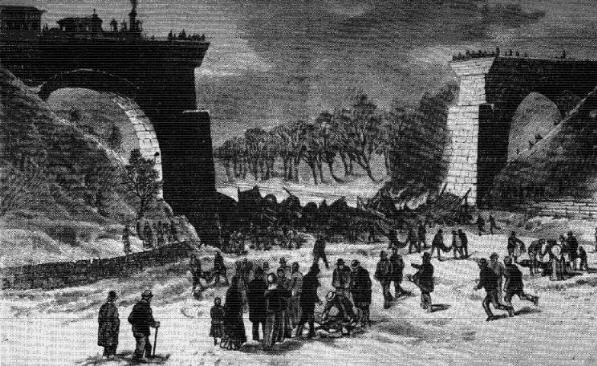
The rescue efforts in the aftermath of the crash. |
There is no death-list to report.
There can be none until the list of the missing ones who traveled by the Lake
Shore Road on Friday is made up. There are o remains that can ever be identified.
The three charred, shapeless lumps recovered up to noon to-day are beyond all
hope of recognition. Old or young, male or female, black or white, no man can
tell. They are alike in the crucible of death. For the rest, there are piles
of white ashes in which glisten the crumbling particles of calcined bones; in
other places masses of black, charred debris, half under water, which may contain
fragments of bodies, but nothing of human semblance. It is thought that there
may be a few corpses under the ice, as there were women and children who sprang
into the water and sank, but none have been thus far recovered.
Dispatch to Cleveland
The haggard dawn, which drove the
darkness out of this valley of the shadow of death, seldom saw a ghastlier sight
than was revealed with the coming of the morning. On either side of the ravine
frowned the dark and bare arches from which the treacherous timbers had fallen,
while at their base the great heaps of ruins covered the one hundred men, women
and children who had so suddenly been called to their death. The three charred
bodies lay where they had been placed in the hurry and confusion of the night.
Piles of iron lay on the thick ice, or bedded in the shallow water of the stream.
The fires smouldered in great heaps, where many of the hapless victims had been
all consumed, while men went about in wild excitement, seeking some trace of
a lost one among the wounded or dead.
The list of saved and wounded
having already been sent, the sad task remains of discovering who may be among
the dead. The latter task will be the most difficult of all, until the continued
absence of here and there a friend will allow of but one explanation - that
he was among those who took this fatal leap.
All the witnesses so far agree
to the main facts of the accident. It was about 8 o'clock, and the train was
moving along at a moderate rate of speed, the Ashtabula station being just
this side of the ravine. Suddenly, and without warning, the train plunged
into the abyss, the forward locomotive alone getting across in safety. Almost
instantly, the lamps and stoves set fire to the cars, and many who were doubtlessly
only stunned, and who might otherwise have been saved, fell victims to the
fury of the flames.
On the arrival of the Cleveland train,
the surgeon of the road organized his corps of assistants, and made a tour of
the various hotels, where the wounded were attended to, such help being given
to each as was possible. The people of Ashtabula lent a willing hand, and all
that human skill and money could do to save life or ease pain was done. The
train which came from Cleveland for the purpose was immediately backed into
position, and long before daylight the least wounded were being prepared for
transportation to Cleveland, to be sent to hospitals or their homes.
The scenes among the wounded were
as suggestive almost as the wreck in the valley. The two hotels nearest the
station contained a majority of these, as they were scattered about on temporary
beds on the floors of the dining-rooms, parlors and offices. In one place,
a man with a broken leg would be under the hands of a surgeon, who rapidly
and skillfully went at his work. In another, a man covered with bruises and
spotted over with pieces of plaster, would look as though he had been snowed
upon, except when the dark lines of blood across his face or limb told a different
story. In some other corner, a poor woman moaned from the pain which she could
not conceal, while over all there brooded that hushed feeling of awe which
always accompanies calamaties of this character.
Towards morning, the cold increased
and the wind blew a fearful gale which, with the snow, that had drifted waist-deep
at points along the line made all work extremely difficult.
At 6 o'clock, the beds in the
sleeping-car of the special train were made up and such of the wounded as
could be moved were transferred there.
The story of most painful interest
to us - to all who will read this book, and all who knew and loved P.P.
Bliss and his wife - is that told by Mr. J.E. Burchell, partner of Mr. B.F.
Jacobs, of Chicago, who was on the ill-fated train. We give his account in full:
There were eleven cars on the train
that left Buffalo at two o'clock Friday afternoon. There were two engines,
three baggage, one smoker, two coaches, three sleepers and one parlor car.
I should judge there were 250 passengers. We pulled out of Buffalo in a blinding
snow-storm, an hour late, and ran at the rate of fifteen miles an hour until
about an hour, or maybe only half an hour, before the accident, when she slacked
up to about ten miles an hour. The second engine was taken on at about Dunkirk.
Just before reaching the bridge, the snow was very heavy, and at that station
near by, the name of which I have forgotten, there was every danger of being
snowed in. We had lost an hour and a half from Buffalo to the bridge.
Before reaching the bridge, I
went through the train and noticed that the coaches and the smoker were filled.
The smoker did not come in its regular order. There were two passenger coaches
ahead of it. Next behind the smoker was the parlor car, in which Mr. Bliss
and his family were, and I noticed it was
one-third full. I was in the car behind the parlor, and my car was filled.
Behind that were the three sleepers, which were also nearly filled.
We neared the bridge
at about 7:45, though due at Ashtabula at 5:15. East of the bridge, the country
is rolling, and beyond the creek it grows more level. We ran on the structure
at a rate of about ten miles an hour, and the whole train was on the bridge
when it gave way. The bridge is about two hundred feet long, and only the
first engine had passed over when the crash came, the weight of the falling
cars nearly pulling back the locomotive that had passed over.
The first thing I
heard was a cracking in the front part of the car, and then the same cracking
in the rear. Then came another cracking in the front louder than the first,
and then came a sickening oscillation and a sudden sinking, and I was thrown
stunned from my seat. I heard the cracking, and splintering and smashing around
me. The iron work bent and twisted like snakes, and everything took horrid
shapes. I heard a lady scream in anguish, "Oh! help me!" Then I heard the
cry of fire. Some one broke a window and I pushed out the lady who had screamed.
I think her name was Mrs. Bingham.
The train lay in
he valley in the water, our car a little on its side, both ends broken in.
The rest of the train lay in every direction, some on end, some on the side,
crushed and broken, a terrible but picturesque sight. Below were the water
and broken ice; seventy feet above was the broken bridge.
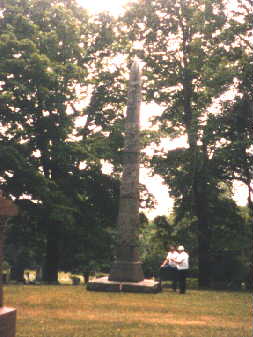
A Cenotaph erected in memory of those killed in the crash, in the Ashtabula,
OH, cemetery. Photo provided by the Bliss Museum. |
Mrs. Bingham sank
down in the snow, and I went back after my coat. Securing that, I went to
her and carried her, with a dozen stumbles and falls, up the bank. The snow
in the valley was nearly to my waist, and I could only move with difficulty.
The wreck was then on fire. The wind was blowing from the east and whirling
blinding masses of snow over the terrible ruin.
The crackling of
the flames, the whistling wind, the screaming of the hurt, made a pandemonium
of that little valley, and the water of the freezing creek was red with blood
or black with the flying cinders. I did not then know that any lives had been
lost. All had escaped alive, though all were bruised or injured. The fire
stole swiftly along the wreck, and in a few moments the cars were all in flames.
The ruins covered the whole space between the two piers, the cars jammed in
or locked together. One engine lay in the creek, smashed to pieces, the ruins
breathing steam and fire.
I carried Mrs. Bingham
to the only house near by, and which appeared to be an engine-house. I was
completely exhausted, and remained there forty-five minutes, when the injured
began to arrive. I think there were fifty-two brought in alive, but one or
two died after their removal to the town, where they were subsequently taken.
The town was about a quarter of a mile distant.
I did not go back
to the wreck, but from the engine-house door I could see into the ravine,
and the fearful scene it presented. The sight was sickening. The whole wreck
was then on fire, and from out the frozen valley came great bursts of flame.
There were crowds of men there, but the fire beat them back, and they could
do nothing. The wounded were lying around in the snow, or were laid on stretchers
or taken on the backs of men and carried up the bluff. The spectacle was frightful,
but those who had gone to assist worked steadily and well in spite of the
intense heat. They carried away all who could be rescued, and then waited
mournfully for the flames to subside, so that bodies might be taken out. As
fast as the injured were secured, they were taken to the hotel. That was some
time before anything could be done, for in thirty minutes after the fall it
was impossible to get near it for the fire. I think it likely that a great
many were buried under the cars, and lost in that way.
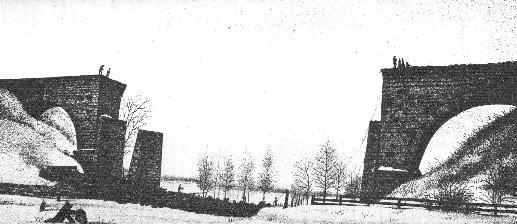
The Ashtabula Bridge, the morning after. |
The hotel was about
a quarter of a mile from the creek, and as the long line of stretchers and
stout men bore the sufferers along, the stormy air was filled with moanings
of anguish. At the hotel, the wounded were kindly cared for. Physicians and
surgeons were early on hand, and every effort was made to relieve the sufferers.
One lady, whos foot had been crushed, was carried shrieking in labor pains
to the little hotel, and during the night she gave birth to a child.
From the top of the bluff to the
water's edge it is, I should think, from seventy to eighty feet, and along
that bluff there ranged lines of excited men looking down on the burning,
helpless agony below. It was a heart-rending scene. The mangled, bleeding
bodies writhed in the terrible tortures around them. Some died with prayer
and some with shriekings of woe on their lips. Some were caught in the iron
and woodwork, and held while the flames crept upon them and burned them in
the very sight of cool, rippling water. As they died, they fixed their bloodshot
eyes longingly upon the snow that beat pitilessly down, and lay white and
beautiful on their smoke-blackened faces. The fire crept steadily on through
the snow flakes, leaping from one mass of ruins to another, licking up the
blood as it passed along, and crushing out human lives as remorselessly as
it curled around the stubborn woodwork.
When the train fell, Mr. Bliss
succeeded in crawling through a window, supposing he could pull his wife and
children after him. But they were jammed fast and every effort of his was
unavailing. The car was all jammed up, and the lady and her children were
caught in the ironwork of the seats. Finding that he could not save them,
he staid there with them and died.
Most all the passengers who escaped
did so by way of the windows. There was no egress at the doors, for the stoves
were there. One lady was pulled from a window, and almost every stitch of
clothing stripped from her, and when they were taking her our the rescuing
party could hear the screams of women and children for aid, but could render
them no assistance.
Those who came from the wreck
said they could see into the cars and could see the charred trunks of those
who had been literally burned to death. They described them as wholly unrecognizable
beyond identification, and presenting the most ghastly scene they had ever
looked on. Some of the unfortunates were burned literally to ashes, and in
some cases only calcined bones were left to tell that human beings had ever
been there.
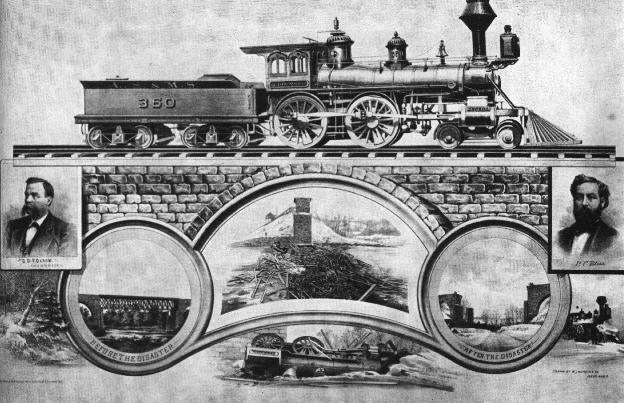
A memorial poster; note the picture of P.P. Bliss at the lower right. |
Of the fifty-two taken from the
wreck, all were more or less injured, and about forty of them dangerously,
if not fatally. I don't remember any names. I was badly shaken up and bruised,
and I think there was only one man who was as little hurt as I was.
There was a fire-engine there,
but there was no hose. I think the fire lasted about an hour, and by that
time, all the cars were burned. I don't think anyone was taken out alive after
the fire. I am fearful that all who were not saved before the flames got headway
perished in the general conflagration.
I should say there were at the
least reckoning one hundred and fifty persons killed outright or burned to
death, and this in spite of the fact that some of the officers claim that
there were only one hundred and sixty-five on the train.
I don't know the name of a human
being among the killed, except Mr. Bliss and his family, and I don't know
the names of any of the injured. All along the road coming from the scene
are anxious men, fearful that friends or relatives were on the train and killed
or injured. Perhaps some of them may yet hear of deplorable losses, for the
railroad officials admit that there were over one hundred killed.
Fortunately, the dear
children of Mr. and Mrs. Bliss had been left at Rome, and they were
safe. The father and mother "went before" them into the valley of the shadow
of death.
Back
to index





